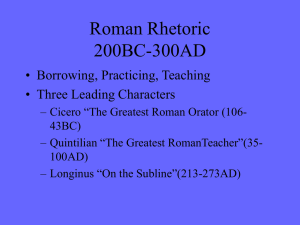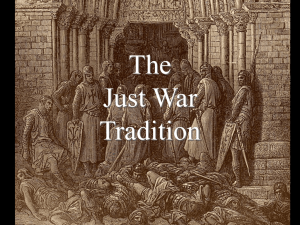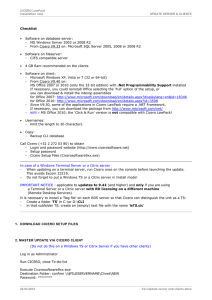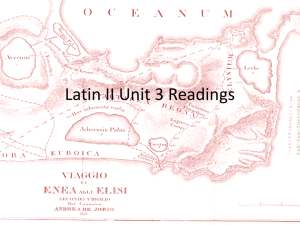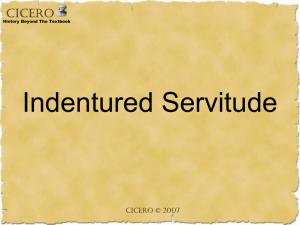A Core Text for Every Curriculum. - Association for Core Texts and
advertisement
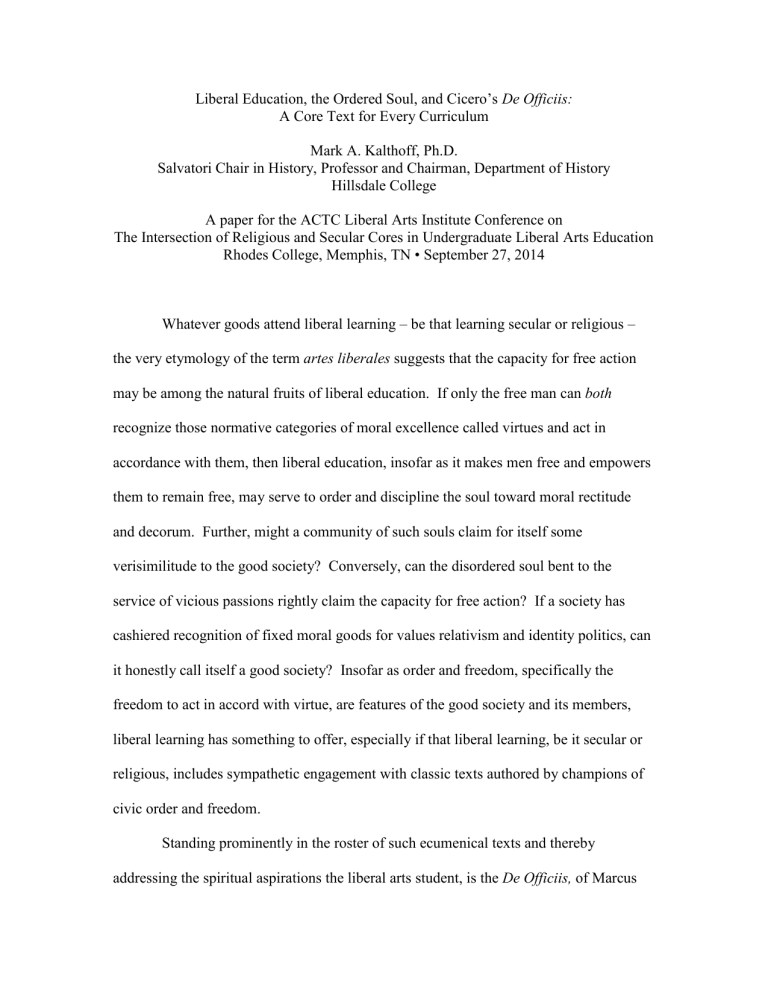
Liberal Education, the Ordered Soul, and Cicero’s De Officiis: A Core Text for Every Curriculum Mark A. Kalthoff, Ph.D. Salvatori Chair in History, Professor and Chairman, Department of History Hillsdale College A paper for the ACTC Liberal Arts Institute Conference on The Intersection of Religious and Secular Cores in Undergraduate Liberal Arts Education Rhodes College, Memphis, TN • September 27, 2014 Whatever goods attend liberal learning – be that learning secular or religious – the very etymology of the term artes liberales suggests that the capacity for free action may be among the natural fruits of liberal education. If only the free man can both recognize those normative categories of moral excellence called virtues and act in accordance with them, then liberal education, insofar as it makes men free and empowers them to remain free, may serve to order and discipline the soul toward moral rectitude and decorum. Further, might a community of such souls claim for itself some verisimilitude to the good society? Conversely, can the disordered soul bent to the service of vicious passions rightly claim the capacity for free action? If a society has cashiered recognition of fixed moral goods for values relativism and identity politics, can it honestly call itself a good society? Insofar as order and freedom, specifically the freedom to act in accord with virtue, are features of the good society and its members, liberal learning has something to offer, especially if that liberal learning, be it secular or religious, includes sympathetic engagement with classic texts authored by champions of civic order and freedom. Standing prominently in the roster of such ecumenical texts and thereby addressing the spiritual aspirations the liberal arts student, is the De Officiis, of Marcus 2 Tullius Cicero (103-43 B.C.). Although some scholars have demurred, calling the text an unpolished hastily-composed “afterthought” lacking philosophical originality, it remains undisputed that De Officiis exercised profound influence upon audiences both pagan and Christian, ancient and modern, and has emerged as a classic statement on the features of an ordered soul and the just society.1 Indeed, De Officiis may be the most copied and widely praised pagan text in the history of the Christian West. In the history of publishing, the profound importance of De Officiis in the Western canon is revealed by its 1465 publication, making it the first classic text to be published and the second only to Gutenberg’s Bible.2 Rapidly written in a brief span of under four weeks during the autumn of 44 B.C., it is a letter, indeed the final extant communication, from the sixtytwo-year-old father to his twenty-one-year-old son, Marcus. In offering his musings on duty, virtue, public life, and private morality, Cicero passes to the next generation his considered judgments regarding human nature and the just society. Accordingly, the text takes up enduring themes and perennial questions whose thoughtful consideration by undergraduates today can prepare, if only in part, for human flourishing. The title of Cicero’s Latin text, De Officiis, is most commonly rendered, On Duties. Such a translation is not without some difficulty, however. Cicero modeled his De Officiis upon the Greek text entitled, Peri tau kathêkontos, “Concerning the appropriate,” by the Stoic philosopher Panaetius (c182-c110 B.C.). Panaetius’ title was the common Stoic phrase used to refer to ethical behavior. The Greek word from the title that Cicero rendered officium (or duty) is Kathêkôn. It is “a much broader term than ‘duty’ and can apply even to plants and animals,” for it connotes action in keeping with the nature of the acting thing. Thus some commentaries may substitute the phrase 3 “appropriate action” for the word “duty.”3 And yet, because human beings, unlike plants or animals, are moral agents, it may be better to render Cicero’s title with a word that carries more ethical heft, such as, On Obligations.4 The principal aim of his title, it seems, is to broadcast the intent to offer advice concerning “appropriate or fitting behavior that is directed towards virtue.”5 Cicero considered life to be a “complex of obligations to oneself and others, in the discharge of which a man realizes the fullest potentialities of his being.”6 What sorts of obligations must be fulfilled? First, there are the obligations of moral rectitude, that is, those things that one must do and become in order to conform to the ethical ideal of the good. Of course, there are other demands too, those Cicero calls the requirements of “expediency.” These, he writes, are “those kinds of duty which have to do with the comforts of life, with the means of acquiring the things that people enjoy, with influence, and with wealth.”7 Finally, there may emerge questions of what one ought to do when faced with an apparent conflict between the good and the expedient, between what seems right conduct and what seems profitable. In each of these categories specific duties or obligations obtain. To know that which is appropriate or fitting for each category requires, as intimated, knowledge of the nature of the subject under consideration, viz., the human person. So these questions demand answers, “What is the human person?” or “What is human nature?” These questions draw one into reflection upon those distinctly human features of our being, not those features merely shared with the beasts. Early in Book I of De Officiis Cicero explicitly distinguishes human nature from that of the lower animals as he identifies those uniquely human traits given by Nature: “[Man] is endowed with reason, 4 by which he comprehends the chain of consequences . . . understands the relation of cause to effect and of effect to cause, draws analogies, and connects and associates the present and the future.”8 Further, only human beings possess “the inclination toward social intercourse”; for Nature, explains Cicero, “prompts men to meet in companies, to form public assemblies and to take part in them themselves.”9 To these he adds as peculiarly human “the search after truth and its eager pursuit,” and the resulting recognition of the eminence and advantage of wisdom, “greatness of soul and a sense of superiority to worldly conditions.”10 He concludes his review of human nature observing that “no other animal has a sense of beauty, loveliness, harmony in the visible world; and Nature and Reason, extending the analogy of this from the world of sense to the world of spirit, find that beauty, consistency, order are far more to be maintained in thought and deed . . .”11 Thus Cicero’s ethical reflection upon duty and moral obligation has begun with a conspectus of the man’s nature, from which he derives corresponding categories of uniquely human moral obligation, categories that correspond directly to the classical four cardinal virtues: first, wisdom or prudence, then justice which is “the bond and principle of civil society,” third, courage or fortitude, and, finally, temperance which “prescribes a rule of decorum or propriety, [and] is characteristically defined as behavior compatible with the inherent dignity of human nature.”12 Here is Cicero’s account: All that is morally right rises from some one of four sources: it is concerned either (1) with the full perception and intelligent development of the true; or (2) with the conservation of organized society, with rendering to every man his due, and with the faithful discharge of obligations assumed; or (3) with the greatness and strength of a noble and 5 invincible spirit; or (4) with the orderliness and moderation of everything that is said and done, wherein consist temperance and self-control.13 As Cicero proceeds to unpack the full meaning and application of these four virtues, it becomes clear why they have been called the “cardinal” virtues. These are the “hinge” virtues, from the Latin word cardo, meaning hinge, key, or pivot. In short, moral excellence, the capacity for ethical flourishing according to the capacities given by nature to man, hinges or turns upon the understanding and cultivation of these four virtues, the classical headwaters of moral rectitude. But Cicero is not content with identification, description, and classification of these four virtues. He explains their relations as components of honorable morality, a discussion that culminates in his consideration of decorum, or “the fitting,” a “distinct quality that can be traced in every kind of virtue.” Cicero continues, “Just as it is impossible to separate loveliness and physical beauty from health so this decorum that I am discussing is thoroughly blended with virtue.”14 Book I finally concludes with a comparison of the virtues and a careful consideration and prioritization of the obligations that arise from each virtue. What good is it, wonders Cicero, were one to possess the greatest virtue of wisdom, if “no practical action were to flow from it.” 15 Consequently, he is persuaded that “service is better than mere theoretical knowledge” and that right action should be ranked above idle speculation.16 Following the conclusion of this first and lengthiest division of De Officiis, Cicero turns to his reflections of Book II to “expediency,” before concluding in Book III with a final investigation into the apparent conflict between the good and the expedient. The 6 discussion of expediency or “utility” emerges from Cicero’s premise that “to succeed in life, one must win the support of one’s fellow, and for this purpose one must know the true grounds of honor and esteem among men.”17 Put simply, it is useful to have the support of one’s fellow men and, therefore, to know what behavior works to win that support. Such expedient behavior by which one gains support may include generosity, military exploits, eloquence in politics, fair dealings in commerce, and so on. Even if the overwhelming majority of actions that are advantageous to winning popular support are also exemplary of moral rectitude, might there also be actions that work to one’s advantage, yet whose moral soundness is suspect? Or alternatively, might some genuinely moral behavior be inexpedient and void of utility? Philosophical speculation upon these ethical questions had led many to believe that the utility of an act could be separated from the question of its moral rectitude. Cicero vigorously opposed the idea pronouncing, “Nothing more destructive than this can be imposed on human life.”18 He admitted that some morally questionable behavior may seem profitable, but he denounced any tendency to prioritize the apparently profitable over the honorable action. “It is extremely shameful,” he asserted, “not only to value what seems profitable more highly than what is right conduct, but also to compare these with each other and to debate inwardly about them.” He credited the Stoics for defending the same rule that he ultimately adopted, namely, “that right conduct is identical with expedient conduct and that no action whatsoever is expedient that is not also right conduct.”19 The apparent conflict between the good and the useful, was just that – apparent, and only apparent to the fool whose soul lacked proper ethical formation. From this rule Cicero generalized to the wider fellowship of men, explaining to his son, 7 “We must all adhere to the principle that what is useful to the individual is identical with what is useful to the community.”20 And later in Book III Cicero reinforces the moral lesson with reference to the tale of the ring of Gyges. As Plato had related the story, the ring enabled one to advance politically by rendering its wearer invisible as he committed vile immoral acts that, despite their moral bankruptcy, secured political power. Cicero concludes, “The point is if a wise man had this same ring, he would not think he was any freer to do wrong than if he did not have it. Good men seek right conduct, not conduct that has to remain concealed.”21 Having “demonstrated that the useful is never found in opposition to the honourable,” Cicero concludes De Officiis and urges his son always to pursue the honorable over pleasure.22 In De Officiis, Cicero presented his son with a manual for ordering the soul. The disordered soul is governed by desires and passions. The ordered soul, governed by a principle of justice and rectitude, renders to the appetites only their due, no more. Offering a guided tour of the contours and features of human nature, a thorough survey of the cardinal virtues, an explanation of their utility for individual and community good, and illustrating how all that possesses decorum will be both honorable and useful, Cicero dismantles the contention that there can ever be a conflict between the honorable and the useful. As a manual of ethics, De Officiis reads like a Roman treatise whose themes are ready to be pressed into service of Christian moral teaching. Consequently, there should be little surprise that these ethical reflections from the pagan statesman-philosopher resonated so well among both secular and Christian audiences. Of course, this consonance with Christian ethics did not mean that Cicero and Ciceronianism would meet with uniform approbation across the history of Christendom.23 8 Indeed, early Christians mustered reasons for skepticism about the value of pagan learning, and some, like Tertullian (c. 160 – c. 220), suggested that pre-Christian philosophy bred heresy. Before long, however, Christians demonstrated genuine openness and appreciation for the pagan intellectual tradition. Clement of Alexandria (c.150 – c. 200) regarded much secular learning as “conducive to piety,” since all Truth was God’s Truth, whatever its human source. Augustine (c. 354 – c. 430) famously explained that “all branches of heathen learning . . . contain liberal instruction” which “we must take and turn to a Christian use,” comparing his own appropriation of GrecoRoman philosophy to the plundering of Egyptian gold and silver by the fleeing Israelites. It was in this spirit, despite its Stoic influences and non-Christian source, that De Officiis would find itself wrapped in the ecumenical embrace of key Christian leaders for centuries.24 Lactantius (c. 240-320) was the first Christian author to see value for the Church in Cicero’s text, citing De Officiis no fewer than forty-two times in his apologetic work, Divine Institutes.25 Ambrose (339-397) adopted Cicero’s text as the model for his own Christian ethical manual by the same title. St. Jerome (347-420) was so taken by Cicero’s words that he heard the voice of God issue the judgment, “Thou art not a Christian, but a Ciceronian.” The list of Cicero’s Christian fans is easily extended. Boethius, Venerable Bede, Alcuin of York, Einhard, and Dante all engaged approvingly with Cicero’s work.26 The Italian Renaissance saw Cicero’s influence enter “its most glorious era,” despite such notable repudiation of Ciceronian ethics as that proffered by Machiavelli’s The Prince.27 Consider, for example, Petrarch (1304-1374) who confessed, “I admire Cicero as much or even more than all whoever wrote a line in any nation. . . . If to admire Cicero means to be a Ciceronian, I am a Ciceronian. . . However, when we 9 come to think or speak of religion . . . I am certainly not a Ciceronian, or a Platonist, but a Christian. I even feel sure that Cicero himself would have been a Christian if he had been able to see Christ and to comprehend his doctrine.”28 Erasmus (1466-1536) thought Cicero’s speech seemed more Christian than pagan and challenged young people to commit his work to memory because, he proclaimed, “reading Cicero makes us better human beings.”29 Melanchthon (1497-1560), author of the Augsburg Confession and widely regarded as the principal force behind the early modern revival of classical liberal learning across Europe, issued his own edition of De Officiis as he made Cicero the backbone of his university Latin curriculum.30 His preface to De Officiis includes Melanchthon’s praise of Cicero and enjoins Christians to “banish the error . . . that the writings of the pagans are unworthy of being read by Christian people.” To the contrary, Melanchthon insisted that “those who disparage philosophy not only wage war against human nature, but they also severely injure the glory of the Gospel.”31 Of course, that Cicero’s warm reception was never a uniquely Christian phenomenon should go without saying. Secular thinkers and statesman of sundry persuasions and nationalities found in Cicero’s work a model and guide.32 Consequently, we have in De Officiis, this final ethical treatise of the famed philosopher-statesman, a textual bridge between the pagan and the Christian, the secular and the religious worlds. By contending in such an accessible way with the grand themes of human nature and moral rectitude, Cicero challenges his reader, a college-aged son, to order his soul and consider his own ethical strengths and moral failings. Such a challenge should confront every young student of the liberal arts whose spiritual aspirations include acquisition of an ordered soul and the inner freedom of virtuous self-government. 10 Endnotes 1 Andrew R. Dyck, A Commentary on Cicero, De Officiis (Ann Arbor: University of Michigan Press, 1996), 1-2, 39-40. Martin Davies, “Book, Printed,” in Anthony Grafton, et al, eds., The Classical Tradition (Cambridge: The Belknap Press of Harvard University Press, 2010), 142. 2 3 Ibid., 7-8. 4 P. G. Walsh, trans., Cicero: On Obligations (Oxford: Oxford University Press, 2000). Thomas P. Scheck, “Humanitas in Cicero’s Moral Philosophy and its Christian Reception,” Ave Maria Law Review 10 (Spring 2012): 407-408. 5 6 Charles Norris Cochrane, Christianity and Classical Culture: A Study of Thought and Action from Augustus to Augustine (1940; reprint, Indianapolis: Liberty Fund, 2003), 52. 7 Walter Miller, trans., Cicero: De Officiis, The Loeb Classical Library, vol. xxi (1913; reprint. Cambridge: Harvard University Press, 1990), 169. 8 Ibid., 13. 9 Cochrane, 53; Miller, 15. 10 Ibid. 11 Ibid., 15, 17. 12 Cochrane, 54-57. 13 Miller., 17. 14 Harry C. Edinger, trans., Cicero, On Duties (Indianapolis: Bobbs-Merrill, 1974), 85. 15 Walsh, 52. 16 Miller, 157,159. 17 Cochrane, 59. 18 Walsh, 57. 11 19 Edinger, 135-136. 20 Walsh, 93. 21 Edinger, 139. 22 Walsh, 125. Anthony Grafton, “Cicero and Ciceronianism,” in Anthony Grafton, et al, eds., The Classical Tradition (Cambridge: The Belknap Press of Harvard University Press, 2010), 194-197. 23 24 Dyck, 41-46. 25 Walsh, xxxv. 26 Carl J. Richard, Twelve Greeks and Romans who Changed the World (Lanham: Rowman & Littlefield, 2003), 185. 27 Walsh, xlii-xliv. Francesco Petrarch, “On His Own Ignorance and That of Many Others,” in Western Heritage: A Reader (Hillsdale: Hillsdale College Press, 2010), 538-539. 28 29 Scheck, 414. Mark A. Kalthoff, “The Usefulness of Useless Knowledge: Defending Classical Liberal Education from Melanchthon to Newman,” Logia: A Journal of Lutheran Theology 21, no. 2 (Eastertide 2012): 51; Walsh, xliv. 30 Philipp Melanchthon, “Preface to Cicero’s On Duties,” in Sachiko Kusukawa, ed., Philipp Melanchthon: Orations on Philosophy and Education (New York: Cambridge University Press, 1999), 81. 31 32 The American founding fathers were especially taken with Cicero. See, for example, Carl J. Richard, Greeks & Romans Bearing Gifts: How the Ancients Inspired the Founding Fathers (Lanham: Roman & Littlefield), 8-12; 152-155.
